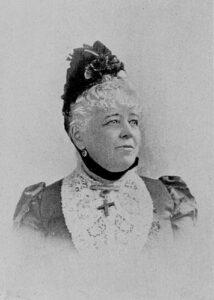De Amerikaanse dichteres en schrijfster Jane Goodwin Austin werd geboren in Worcester, Massachusetts, op 25 februari 1831 als dochter van Isaac Goodwin, advocaat, antiquaar en genealoog. Haar moeder was een dichteres en liedjesschrijfster, en een liefhebster van tradities en anekdotes, en veel van de verhalen die in de latere werken van Austin zijn belichaamd, werden voor het eerst gehoord op de schoot van haar moeder. Haar beide ouders waren afstammelingen van Mayflower-pelgrims. Mogelijk heeft geen enkele andere schrijver zoveel gedaan als zij om de gebruiken en tradities van de Pilgrim Fathers vers in het geheugen van volgende generaties te houden. Hoe grondig zij het puriteinse karakter begreep, blijkt uit haar vier laatste werken: “The Nameless Nobleman” (1881, 1889); “Standish of Standish” (1899); “Dr. Le Baron and His Daughters” (1890). en “Betty Alden” (1891), die de periode beslaan van de landing van de pelgrims in 1620 tot de revolutie in 1775. Op het moment van haar dood werkte ze aan een vijfde deel, dat de serie zou voltooien. De “Nameless Nobleman” in het boek met die titel was Francois Le Baron, de overgrootvader van haar moeder. Andere boeken van haar hand zijn: “Fairy Dreams” (1859); “Dora Darling” (1865); “Outpost: a Novel” (1866); “Tailor Boy” (1867); “Cypher” (1869); “The Shadow of Moloch Mountain” (1870); “Moon Folk: a True Account of the Home of the Fairy Tales” (1874): “Mrs. Beauchamp Brown” (1880); “Nantucket Scraps” (1882) en “The Desmond Hundred,” Round Robin Series (1882). Naast deze werken schreef ze een groot aantal verhalen en enkele gedichten voor de belangrijkste tijdschriften en kranten. Ze stierf in Boston op 30 maart 1894.
Uit: Betty Alden
“Tell him yourself, Pris.”
“No, no, Bab, I know too much for that! These men love not to be taught by a woman, although, if all were known, full many a whisper in the bedchamber comes out next day at the council board, and one grave master says to another, ‘Now look you, tell it not to the women lest they blab it!’ never mistrusting in his owl-head that a woman set the whole matter afloat.”
“Oh, Pris, you do love to jibe at the men. How did you ever persuade yourself to marry one of them?”
“Why, so that one of them might be guided into some sort of discretion. Doesn’t John Alden show as a bright example to his fellows?”
“And all through his wife’s training, eh, Pris?”
“Why, surely. Didst doubt such a patent fact, Mistress Standish?”
“But now, Pris, in sober sadness tell me what has given you such dark suspicions of these new-comers, and how do you venture to whisper ‘treason’ and ‘traitor’ about a man who has been anointed God’s messenger,[Pg 2] even though it has been in the papistical Church of England?”
“If the English bishops are such servants of antichrist as the governor and the Elder make them out, I should conceive that their anointing would be rather against a man’s character than a warrant for it.” And Priscilla Alden laughed saucily into the thoughtful face of her friend and neighbor, Barbara Standish, who, knitting busily at a little lamb’s-wool stocking, shook her head as she replied,—
“Mr. Lyford is not a man to my taste, and I care not to hear him preach, but yet, we are told in Holy Writ not to speak evil of dignitaries, nor to rail against those set over us”—
“Then surely it is contrary to Holy Writ for this Master Lyford to speak evil of the governor and to rail against the captain, as he doth continually”—
“Who rails against the captain, Mistress Alden?” demanded a cheerful voice, as Myles Standish entered at the open door of his house, and, removing the broad-leafed hat picturesquely pulled over his brow, revealed temples worn bare of the rust-colored locks still clustering thickly upon the rest of his head, and matching in color the close, pointed beard and the heavy brows, beneath which the resolute and piercing eyes his enemies learned to dread in early days now shone with a genial smile.
“Who has been abusing the captain?” repeated he, as the women laughed in some confusion, looking at each other for an answer. Priscilla was the first to find it, and glancing frankly into the face of the man she might once have loved replied,—
“Why, ’tis I that am trying to stir Barbara into[Pg 3] showing you what a nest of adders we are nourishing here in Plymouth, and moving you and the governor to set your heels upon them before it be too late.”

Jane Goodwin Austin (25 februari 1831 – 30 maart 1894)
